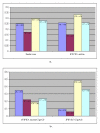Strand bias in complementary single-nucleotide polymorphisms of transcribed human sequences: evidence for functional effects of synonymous polymorphisms
- PMID: 16916449
- PMCID: PMC1559705
- DOI: 10.1186/1471-2164-7-213
Strand bias in complementary single-nucleotide polymorphisms of transcribed human sequences: evidence for functional effects of synonymous polymorphisms
Abstract
Background: Complementary single-nucleotide polymorphisms (SNPs) may not be distributed equally between two DNA strands if the strands are functionally distinct, such as in transcribed genes. In introns, an excess of A<-->G over the complementary C<-->T substitutions had previously been found and attributed to transcription-coupled repair (TCR), demonstrating the valuable functional clues that can be obtained by studying such asymmetry. Here we studied asymmetry of human synonymous SNPs (sSNPs) in the fourfold degenerate (FFD) sites as compared to intronic SNPs (iSNPs).
Results: The identities of the ancestral bases and the direction of mutations were inferred from human-chimpanzee genomic alignment. After correction for background nucleotide composition, excess of A-->G over the complementary T-->C polymorphisms, which was observed previously and can be explained by TCR, was confirmed in FFD SNPs and iSNPs. However, when SNPs were separately examined according to whether they mapped to a CpG dinucleotide or not, an excess of C-->T over G-->A polymorphisms was found in non-CpG site FFD SNPs but was absent from iSNPs and CpG site FFD SNPs.
Conclusion: The genome-wide discrepancy of human FFD SNPs provides novel evidence for widespread selective pressure due to functional effects of sSNPs. The similar asymmetry pattern of FFD SNPs and iSNPs that map to a CpG can be explained by transcription-coupled mechanisms, including TCR and transcription-coupled mutation. Because of the hypermutability of CpG sites, more CpG site FFD SNPs are relatively younger and have confronted less selection effect than non-CpG FFD SNPs, which can explain the asymmetric discrepancy of CpG site FFD SNPs vs. non-CpG site FFD SNPs.
Figures

Similar articles
-
Sequence context analysis of 8.2 million single nucleotide polymorphisms in the human genome.Gene. 2006 Feb 1;366(2):316-24. doi: 10.1016/j.gene.2005.08.024. Epub 2005 Nov 28. Gene. 2006. PMID: 16314054
-
Directionality of point mutation and 5-methylcytosine deamination rates in the chimpanzee genome.BMC Genomics. 2006 Dec 13;7:316. doi: 10.1186/1471-2164-7-316. BMC Genomics. 2006. PMID: 17166280 Free PMC article.
-
The influence of neighboring-nucleotide composition on single nucleotide polymorphisms (SNPs) in the mouse genome and its comparison with human SNPs.Genomics. 2004 Nov;84(5):785-95. doi: 10.1016/j.ygeno.2004.06.015. Genomics. 2004. PMID: 15475257
-
[Chimpanzee genome sequencing and comparative analysis with the human genome].Tanpakushitsu Kakusan Koso. 2006 Feb;51(2):178-87. Tanpakushitsu Kakusan Koso. 2006. PMID: 16457209 Review. Japanese. No abstract available.
-
Computational prediction of the effects of non-synonymous single nucleotide polymorphisms in human DNA repair genes.Neuroscience. 2007 Apr 14;145(4):1273-9. doi: 10.1016/j.neuroscience.2006.09.004. Epub 2006 Oct 19. Neuroscience. 2007. PMID: 17055652 Review.
Cited by
-
Transcription induces strand-specific mutations at the 5' end of human genes.Genome Res. 2008 Aug;18(8):1216-23. doi: 10.1101/gr.076570.108. Epub 2008 May 7. Genome Res. 2008. PMID: 18463301 Free PMC article.
-
Copy variations in schizophrenia and bipolar disorder.Cytogenet Genome Res. 2008;123(1-4):27-35. doi: 10.1159/000184689. Epub 2009 Mar 11. Cytogenet Genome Res. 2008. PMID: 19287136 Free PMC article. Review.
-
Ovine forkhead box class O 3 (FOXO3) gene variation and its association with lifespan.Mol Biol Rep. 2013 May;40(5):3829-34. doi: 10.1007/s11033-012-2461-7. Epub 2013 Jan 9. Mol Biol Rep. 2013. PMID: 23299403
-
Strand bias structure in mouse DNA gives a glimpse of how chromatin structure affects gene expression.BMC Genomics. 2008 Jan 14;9:16. doi: 10.1186/1471-2164-9-16. BMC Genomics. 2008. PMID: 18194530 Free PMC article.
-
Evolution in health and medicine Sackler colloquium: Genetic variation in human telomerase is associated with telomere length in Ashkenazi centenarians.Proc Natl Acad Sci U S A. 2010 Jan 26;107 Suppl 1(Suppl 1):1710-7. doi: 10.1073/pnas.0906191106. Epub 2009 Nov 13. Proc Natl Acad Sci U S A. 2010. PMID: 19915151 Free PMC article.
References
-
- Lobry JR. Asymmetric substitution patterns in the two DNA strands of bacteria. Mol Biol Evol. 1996;13:660–665. - PubMed
Publication types
MeSH terms
Substances
LinkOut - more resources
Full Text Sources

